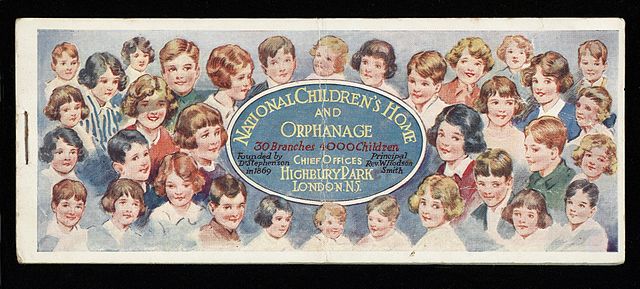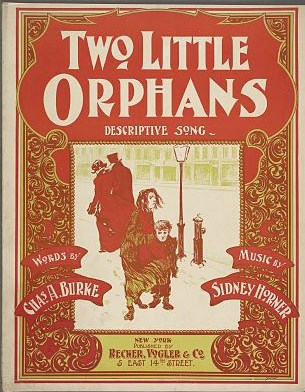Among the common character types that exist in fiction, the orphaned protagonist[*] is one that readily elicits sympathy from readers. Regardless of material circumstances, both the real and perceived disadvantages of parental loss[†] make for excellent storytelling. As author Liz Moore observes, the orphaned character has a “built-in problem, which leads to built-in conflict”. Since her works feature orphans, she worries “whether it is facile to rely on this trope”. The answer to this conundrum lies in how the story is written. When authors choose to use familiar character tropes, they either employ the trope with care, ensuring that the orphaned character’s loss serves a narrative purpose, or they introduce fresh approaches to the trope’s characterization and problems. I discuss some common features of the orphan trope and provided examples that illustrate how writers make the orphan trope meaningful.
Trope Expectations and Succinct Storytelling
Creating a character that comes with a problem needing resolution, one that readily generates sympathy, also allows writers to streamline their storytelling. As John Mullan explains, “The orphan is above all a character out of place, forced to make his or her own home in the world…set loose from established conventions to face a world of endless possibilities (and dangers).” Since the orphan trope includes these expectations, we don’t need the author to explain why their orphans beg or steal (Ren from the The Good Thief, the Artful Dodger from Oliver Twist); we already know they must fend for themselves and possess few options for doing so. Childhood (mis)adventures, too, are more readily undertaken without parental objection, giving writers incentive to remove parents from the plot.[‡] However, such reasons alone are insufficient for orphaning a character. Julie Just points to the recent trend of young adult fiction replacing dead parents with absentee, inattentive, or incompetent parents,[§] a move that still affords young characters both opportunity and reason to adventure or “act out”. Similarly, characters can experience social isolation or loneliness without being orphaned. Therefore, employing the orphan trope must serve a greater narrative purpose than mere convenience.
All the Living
In All the Living, C. E. Morgan’s thoughtful approach to the orphan trope lets the story focus on her young lovers and quietly makes Aloma’s orphaning central to the novel’s conflict as it explores how varied the experience of loss can be. As an orphan (now grown), Aloma can more readily ignore social convention when she moves in with boyfriend Orren to help him run his family’s farm following the sudden deaths of his brother and widowed mother.[**] While Aloma’s childhood loss avoids uninteresting complications parents would add to the plot, it also leaves her unprepared for Orren’s grief and how it alters him. Unlike Orren, she cannot recall her parents and experiences their deaths as an absence. Because Aloma never had a home, she cannot empathize with Orren when he refuses to either reside in or rent the house he once shared with his deceased loved ones and they quarrel. Orren also misunderstands her behavior, finding her tendency to “look outward” infuriating because he forgets or fails to see that her actions reveal an orphan’s need for connection. In Morgan’s hands, sharing a history of loss prevents these lovers from finding common ground. Thus, their losses generate more misunderstanding than they provide comfort.

Unhappy Upbringings
Of course, literary orphans lose more than family when their parents die. For many orphans, parental loss also affects their material, emotional, and social support. However, their new “homes” rarely offer respite or welcome orphaned children—even when they are kin.[††] The orphan’s quest to find acceptance arises in response to this rejection. The trope’s difficulty here lies with the reasons the child isn’t wanted. Literature happens to be littered with cruel, prejudiced or indifferent guardians that range from rotten relations (stepparents, aunts and/or uncles) to unkind orphanage staff. Failing this (or even in conjunction with it), the other common difficulty that necessitates the child’s quest for belonging involves the guardian’s financial distress (Aloma, Anne Shirley from Anne of Green Gables). Of note, Jane Eyre, Harry Potter, and Aloma all lived with aunts and/or uncles before departing to a boarding school. And Jane and Harry both lived with guardian(s) who begrudged them their upkeep, even though they could readily afford their expenses. While some literary orphans manage to find acceptance through self-improvement and changing the status quo (Mary Lennox, The Secret Garden), most do not. Therefore, inventive approaches to writing these characters’ unhappy circumstances is critical when using these common themes.
The Harry Potter series
In the Harry Potter’s series, Vernon and Petunia Dursley’s have few qualms about expressing their displeasure with Harry’s presence in their lives. Rowling, however, complicates their distaste for Harry by rooting it in intolerance and jealousy. Vernon Dursley rather straightforwardly dislikes people unlike himself and wants to curb any magical ability Harry displays, prompting him to take extraordinary measures to prevent Harry from learning he’s a wizard. Petunia Dursley’s motivations, however, are more nuanced. Her sister, Lily Potter, is regularly described in glowing terms (beautiful, smart, kind, etc.), making Petunia one of her rare detractors. She denounces Lily as a freak but in the same scene indicates that their parents admired Lily’s magical ability, exposing her envy. Petunia obviously feels overlooked because her young sister managed to be remarkable in yet another way. She transfers her resentment to Harry, spoiling her son while denying Harry material comforts to ensure Dudley never feels as she did. Regardless of how much trouble Harry causes her, she begrudgingly allows him to stay, suggesting that some lingering duty or love for her sister remains.
Ambiguous Identity and Transformation
Mullan’s observation that orphans are “out of place” gives them the freedom to reinvent themselves and discard their old lives. Although their unfixed social status allows them to transcend their social circumstances, this ambiguity also makes maligning them easy. The same orphan can be classified as both dangerous or brave—incidentally, terms used to describe both Harry Potter and archvillain Lord Voldemort. The orphan’s ambiguous status also provides ample opportunity to create and resolve conflicts in the narrative (a boon for developing story arcs), but such volatility should have a goal (eg, revealing character). Conferring wealth as a reward to the orphaned protagonist, for example, ensures a happy ending but feels unearned when a previously unknown relation exists solely to enrich said orphan by dying.[‡‡]
Jane Eyre
After Jane Eyre endures a punishment that causes her to faint, the kind apothecary caring for her learns that her aunt’s mistreatment caused her collapse. He offers Jane an opportunity to attend Lowood Institution, a school that educates poor girls. The promise of a fresh start, however, soon sours when her Aunt Reed unjustly characterizes her as a liar to the school director. Accepting Aunt Reed’s word without question, he assures them that the staff will be told about Jane’s wicked behavior. Beyond creating conflict and generating future difficulties for Jane, Brontë’s goal here is to provide Jane with a defining moment. With this latest bit of malice, Aunt Reed finally pushes Jane into finally speaking up for herself, an ability she needs to develop since she has no one else to defend her. Jane grows as a character, no longer willing to suffer slights.
Summary
While the orphan trope has its stock characters, genre expectations, and standard plot lines, writers who make these moments purposeful transform an old story into a meaningful discussion about belonging and identity, something every young protagonist (parents or not) considers as they age into adulthood. And that conversation is an interesting one, however many times we have it, when more considered approaches make the story feel new again.
Updated headers on 10 March 2023.
NOTES:
[*] Most orphans (by definition) are children. Adults usually do not identify as orphans unless they lost their parents during childhood.
[†] Contrary to expectation, some orphans prosper without at least one of their parents (eg, Huckleberry Finn). Being spared parental mistreatment, however, neither offsets nor lessens the child’s experience of loss.
[‡] For much the same reason, most orphan characters are only children.
[§] The trend here is also somewhat practical given that pandemics are less common than they once were.
[**] Of note, Aloma lives in a prevalently conservative area of rural Kentucky during the 1980s, where couples were discouraged from living together before marriage.
[††] Rose from Louisa May Alcott’s Eight Cousins is a notable exception where guardian and extended family alike welcome her.
[‡‡] While one can argue that Jane needs to become wealthy to attain equal footing with Mr. Rochester, he already had no objections to marrying her without money and his injuries better serve this purpose.



Fascinating stuff! I’ve encountered the orphan in the classics, but (unsurprisingly) not so much in contemporary fiction and had never really thought about how the modern author needs to make it meaningful and new.
In my experience of reading outside the Anglosphere, I’ve noticed the orphan in fiction from Ghana, Nigeria, India and Russia where novelists are representing street children. Having read your article, I’m going to be paying more attention to how they are represented, so thanks:)
LikeLiked by 2 people
Thanks! I also appreciate your observations that orphan characters outside the Anglosphere (fantastic term) occur in works depicting street children. In those places where disease, poverty, war, and so forth are common, the viewpoint of an orphan is useful lens to view social ills (just as it was when Bronte and Dickens wrote).
LikeLike
Outside of fantasy novels/movie (where there’s permission to ignore the rules of reality), a child abandoned on a doorstep doesn’t make much sense in the 20th/21st century modern world unless it occurs in places with little government or that are quite remote. I suspect it’s unlikely people who find abandoned children would be candidates to adopt if they hadn’t already gone through the prospective adoptive parent or foster parent processes. But movies and such tend to “hand wave” things to speed up storytelling. In reality, adoption takes a bit of time unless the parents have named guardians in their last will. Many adoptees in literature (Jane Eyre, Harry Potter), however, end up with the unloving guardians who are relatives.
LikeLike
Very interesting, Rita! I have a kind of orphan (parents alive but abhorrent/absent) in my WIP and there is something I recognise there about freedom to decide for yourself while still mourning loss, and seeking new attachment but with a good deal of wariness. I have not thought a great deal about orphan characters in contemporary fiction but they certainly figure a great deal in fairy tales! Thanks for the post.
LikeLiked by 1 person
Thanks, Maria! I think orphan characters aren’t quite so common these days as mortality rates are quite different. It might be more common to see missing/absentee parents (as in your novel, The Chicken Soup Murder) or children foster care.
LikeLiked by 1 person